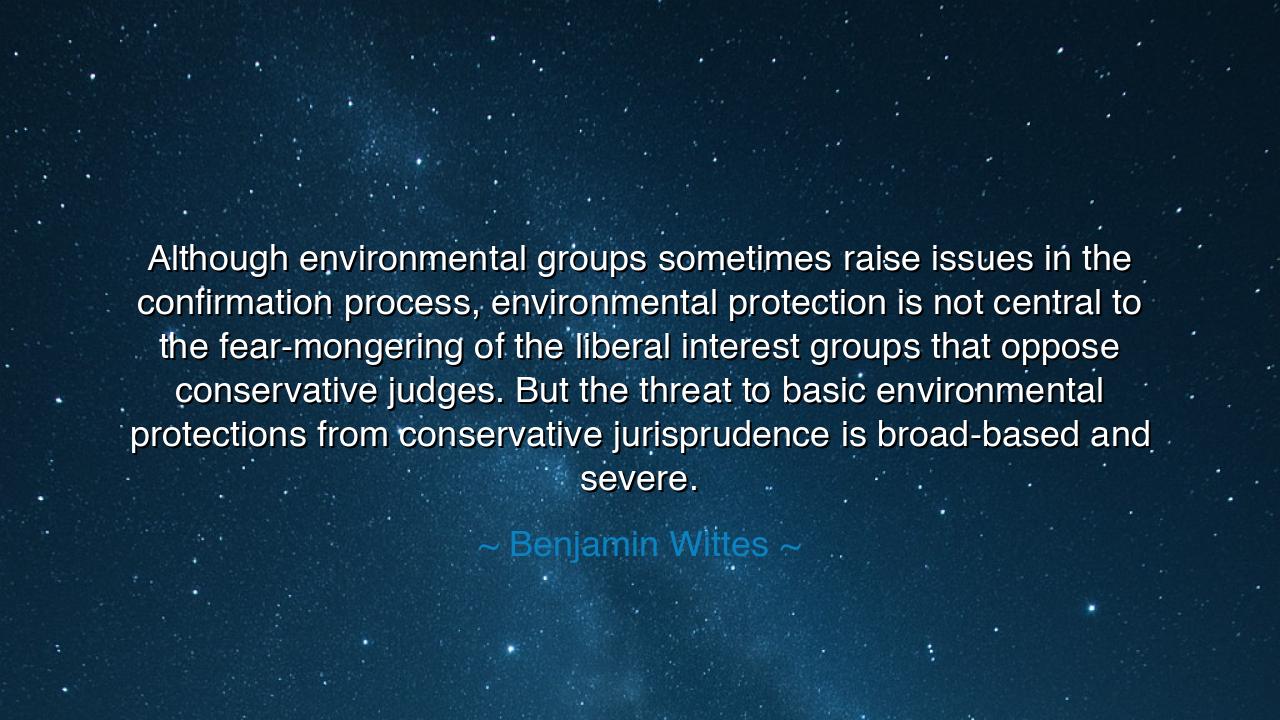
Although environmental groups sometimes raise issues in the
Although environmental groups sometimes raise issues in the confirmation process, environmental protection is not central to the fear-mongering of the liberal interest groups that oppose conservative judges. But the threat to basic environmental protections from conservative jurisprudence is broad-based and severe.






The words of Benjamin Wittes, careful observer of law and governance, strike with the gravity of prophecy: “Although environmental groups sometimes raise issues in the confirmation process, environmental protection is not central to the fear-mongering of the liberal interest groups that oppose conservative judges. But the threat to basic environmental protections from conservative jurisprudence is broad-based and severe.” In this, he unmasks a paradox of our time: that in the vast storms of political conflict, the fate of the environment—the air we breathe, the waters we drink, the soil that feeds us—too often stands at the margins, when in truth it should stand at the center.
At its heart, this quote recognizes the power of jurisprudence, the rulings of judges whose interpretations of law shape not only the present but the generations to come. Laws of Congress may be written in grand declarations, but it is the courts that breathe life or silence into those words. Wittes warns that within conservative rulings, there is a tendency to limit the reach of government in enforcing environmental protections, thereby weakening the shield that guards the earth. What seems like abstract legal reasoning in marble halls may, in truth, decide whether rivers run clean or poisoned, whether skies clear or darken with smog.
History offers us many reminders of this tension between law and environment. In the early days of the Industrial Revolution, factories rose unchecked, and rivers like the Thames in London became cesspools of waste. It was not until courts and lawmakers began to recognize the right of communities to live free from toxic harm that protections took shape. In America, the Clean Air Act and the Clean Water Act were forged in the 1970s, but their power rested upon how judges chose to interpret them. Time and again, judicial rulings either expanded or curtailed their reach. Thus, Wittes’ words remind us: the struggle for environmental justice is fought not only in legislatures, but also in courts of law.
His statement also unveils another truth: that in the heat of political battles, environmental concerns are often treated as secondary. When judges are nominated, debates rage over social issues, economics, or rights, but rarely does the defense of the environment rise to the forefront. Yet, as Wittes insists, the threat from jurisprudence is severe. While interest groups may fear-monger over other issues, the quiet erosion of environmental law proceeds steadily, almost unnoticed, like a tide that withdraws grain by grain until the shoreline is transformed.
The danger here is subtle but profound. For when protections are weakened, it is not only nature that suffers—it is the people. The poor breathe the dirtiest air, the marginalized live nearest to toxic waste, and the children inherit the consequences of neglect. If courts decide that government cannot act strongly to protect the commons, then it is the weakest who are left defenseless. Thus, Wittes’ words are not simply about law—they are about justice, fairness, and the moral duty to safeguard creation itself.
The lesson of this teaching is that vigilance must extend beyond politics into the realm of law. Citizens must learn that battles over judicial philosophy are also battles over the fate of the environment. It is not enough to demand new laws; one must also guard how courts interpret the laws already written. Just as farmers once watched the skies for signs of drought, so too must we watch the courts for signs of rulings that may drain away protections silently.
Therefore, children of tomorrow, let this wisdom be engraved upon your hearts: do not neglect the courts when you labor for the earth. Understand that judges, with their pens, may either shield or shatter the protections upon which your future depends. Support leaders who see environmental law not as an afterthought, but as central to justice itself. Speak out when rulings weaken your common inheritance. For if the guardians of law fail to protect the land, the rivers, and the air, then what remains of liberty will be hollow. Remember always: the defense of the earth is not only political but judicial, and it is your duty to guard it with vigilance and courage.






AAdministratorAdministrator
Welcome, honored guests. Please leave a comment, we will respond soon